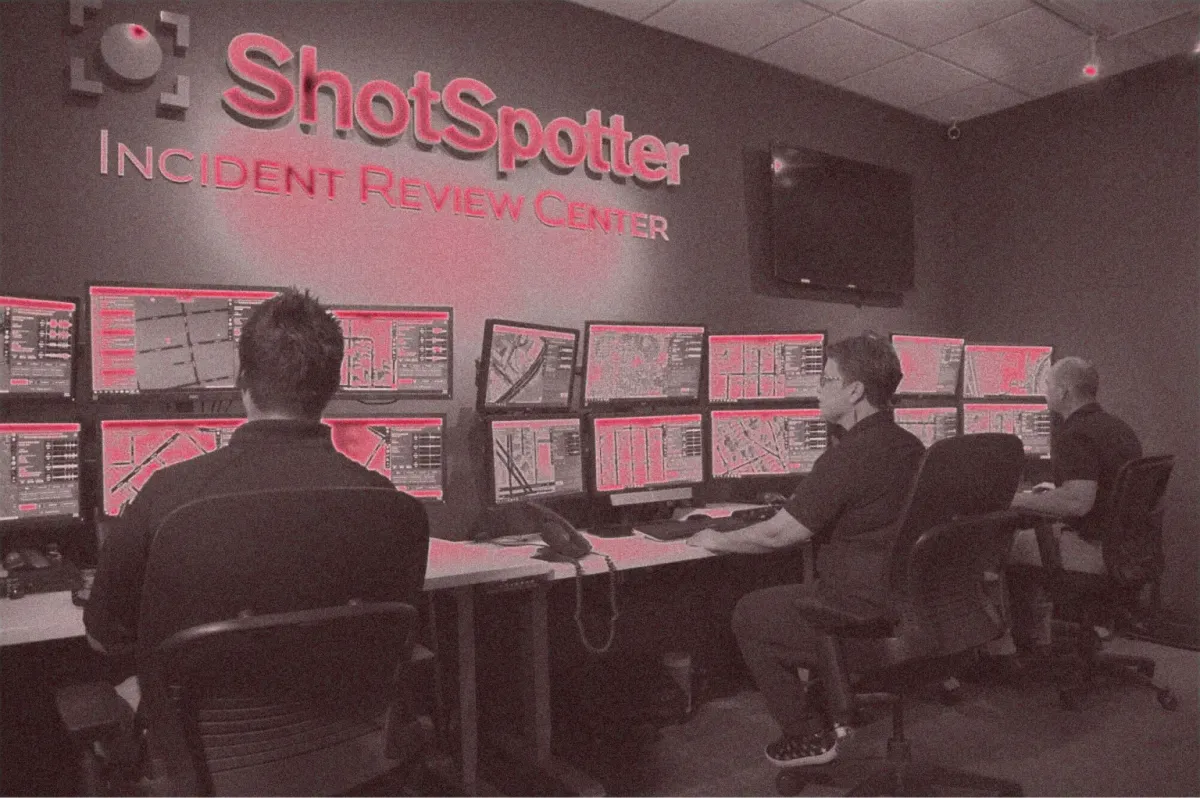
Since 2022, Pasadena Police Department (PPD) has contracted with acoustic surveillance company ShotSpotter to use its technology to better respond to shootings, curb gun violence, and help find evidence used to solve crimes. But data obtained through public records requests by Knock LA from 2022 and 2023 tell a starkly different story, one of minimal arrests, little obtained evidence, and hundreds of hours of wasted police resources.
ShotSpotter, which is now a part of SoundThinking Technologies, uses acoustic surveillance devices installed on light poles or buildings that are actively listening for gunshots 24/7 in neighborhoods. Pasadena became the first to implement the technology in Los Angeles County, immediately sparking resistance from community groups and privacy advocates. Many are worried about its impact on marginalized communities that are already overpoliced and surveilled. Neither the company nor the police has disclosed where exactly the devices are installed, but the alerts pinned on maps made by ShotSpotter show that the technology is exclusively installed in poor and minority neighborhoods.
The company claims it is 98% effective in detecting gunshots — a fact only they can review and verify — and that their technology can find the source of a gunshot within an 82-foot radius. But the data obtained through a public records request from PPD shows that the technology isn’t very effective in finding even a sign of a gun crime being committed, calling into question the technology’s own claims.

In over 75% of calls, ShotSpotter sent police out to alerts where no gun casings were found. Officers investigating alerts most commonly commented that they were unable to locate a gun casing, or commented that a “nail gun,” “firework,” or “car backfiring” had erroneously set off the alert.
ShotSpotter only alerted a homicide once in 2022, during a year where there were 49 shooting investigations — with 14 people injured or killed in a shooting. It only alerted the police to five gunshot victims also that year
PPD prioritizes ShotSpotter alerts over other calls, including 911 calls. Per the department’s policy, ShotSpotter calls are “Priority 1” and are approached as a crime in progress with a firearm. Yet, as the data shows, the police are dedicating well over a majority of their time and resources to a type of call unlikely to actually help them locate any sign of a shooting. Records show 75% of those calls had no link to a 911 call, sending police out to investigate alerts not initiated by a person reporting a crime. Even after canvassing an alert, only 22% of police walked away with a police report in 2022. The department has collectively spent 283 hours on ShotSpotter calls since the contract’s start, adding to the growing fiscal impact on the city’s budget.

The data from the first two quarters of this year is trending to be more of the same. In 76% of alerts, no gun casings were found, and only 13% of the alerts led to a criminal report that investigators can follow up on.
The technology company boasts its success in its 150-city footprint, pointing to stats on how many lives have been saved and to contract extensions with Cincinnati. Yet several cities nationwide are reconsidering or canceling their contracts with the company. San Antonio, Charlotte, Houston, Atlanta, and Dayton all canceled their contracts with the company, citing mixed results, budget constraints, and complaints of delays responding to other 911 calls. Those cities have netted the same lackluster results as Pasadena’s. In the case of Chicago, the city’s data showed that in 21 months police were sent out on 40,000 calls that led to police finding zero evidence of a shooting incident. In all of these cases, each city’s data is at odds with SoundThinking’s claims and research of accuracy and investigative impact.

The future of ShotSpotter in Pasadena is unclear. The PPD’s presentation in June to Pasadena City Council’s Public Safety Committee was met with tepid responses. The data presented mirrored that of other cities that have canceled their contracts with the company. So far, $430,000 of the city’s 3-year $630,000 contract for SoundThinking’s services and monitoring has been spent. That doesn’t take into account the unknown cost of resources the city is spending to chase alerts that only come up empty-handed.
When asked if he thought ShotSpotter has reduced the number of shooting incidents, PPD Commander William Grisafe said, “If I were to say that ShotSpotter is responsible for the decrease, no. It is the coordination of a lot of different things.”
